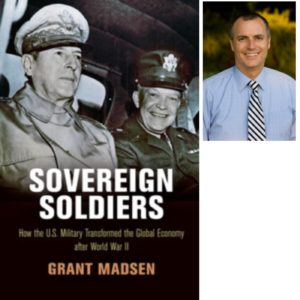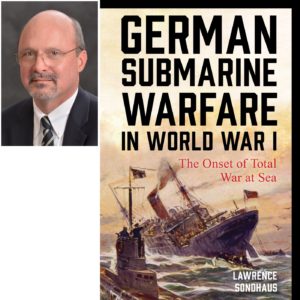Podcast: Play in new window | Download
Subscribe: RSS
 Dr. Grant Madsen has long been interested in history and this led him to earn a PhD in History. Sovereign Soldiers is his first book and explains how the US military transformed the global economy with the economic policies it applied to the occupation of Germany and Japan after WWII.
Dr. Grant Madsen has long been interested in history and this led him to earn a PhD in History. Sovereign Soldiers is his first book and explains how the US military transformed the global economy with the economic policies it applied to the occupation of Germany and Japan after WWII.
2:03 – Dr. Madsen talks about how he got into studying and writing about history. He grew up with historians and he felt he made sense of the world historically. He decided to get a PhD in history and the book stems from his dissertation research.
5:10 – Dr. Madsen talks about the details of the book. After WWII, the US military men found that they needed to understand how to run the economies of Germany and Japan. Joseph Dodge was instructed to fix the economy of Japan.
7:28 – There is agreement that these military leaders succeeded in developing the occupied territories and helped the economy of the West. Dr. Madsen examined economic theories and practice in his research.
9:43 – Economic stability seemed to be the key to success. Dr. Madsen feels there was no Keynesian approach to how these economies were developed.
12:03 – The military had economic policies in place as soon as the occupation periods started. These policies were based on New Deal policies but disappeared over the time of the occupations. Germany had cartels and Japan had zaibatsus which had to be worked with to develop these economies.
15:28 – The military dropped its military economic policies quickly in Germany and used a new approach to build that economy. Japan took a little longer to develop.
17:24 – Though the US held all military power in Japan and Germany, it wasn’t useful in imposing US economic will. Clay in Germany and MacArthur in Japan had to be careful on how they used their military power.
20:48 – About 1947, the US military was focused on making Japan and Germany capable of helping to resist the Soviets.
22:46 – There was a fight between State and Defense on who would pay for the occupations. The military was stuck with the bill. Many military leaders didn’t want to be blamed for failure in the occupations since they didn’t think they would succeed. They didn’t want to look bad like it had in earlier decades.
26:06 – In 1947-48, the US strategically decided to make Germany and Japan perimeter defenders against the Soviets. The initial plan was to jointly control Germany with four nations to create worldwide peace and cooperation, but by 1947, Germany became a country that would be a perimeter. Military bases became a way to funnel US money into Germany and Japan.
30:38 – The book starts with the Spanish-American War where the US begins controlling other territories. The US had governance issues when they planned to stay in places only temporarily. The book first focuses mainly on the Philippines during the early occupation. The middle chapters talk about Germany and Japan. The final chapters focus on Eisenhower’s military-economic focus.
35:41 – Joseph Dodge left many useful historical papers to the Detroit Public Library. Mr. Madsen also used the various Presidential libraries for his research. The Eisenhower address took on a different tone as he did his research.
40:36 – One question Dr. Madsen had was how were US leaders using the word democracy. He decided that the word was a stand in for the term economic policy.
43:44 – It’s around WWI that countries realize that military power and industrial economy became strongly linked. Eisenhower jumped up in the ranks quickly because he understood combined arms and industrial conversion of a peacetime economy to a wartime economy.
47:19 – Right after the war, the US and the Soviets discussed what economic system they would impose on Germany. The Soviets planned to just let the Germans starve and had no plan for an economic system there. By 1947, the Soviets imposed communism since they saw they had to grow East Germany to counter the West.
51:28 – In 1950, the Japanese economy was struggling and an anti-American Prime Minister was elected. This was when the US changed course in Japan.
53:11 – Dr. Madsen hopes that the book changes how historians discuss the post war period. Peacekeeping operations are much more common than wartime operations so this is an important subject to study in regards to war and the history of military nation building and peacekeeping.
59:21 – His website is grantmadsen.net.
Links of interest
For more “Military History Inside Out” please follow me on Facebook at warscholar, on twitter at Warscholar, on youtube at warscholar1945 and on Instagram @crisalvarezswarscholar
Guests: Grant Madsen
Host: Cris Alvarez
Tags: military, history, military history, conflict, war, interview, non-fiction book, spanish-american war, Philippines, Germany, Japan, MacArthur, Eisenhower, Soviet Union, economy, military-industrial complex, Keynesian

 Dr. Lawrence Sondhaus is Professor of History at the University of Indianapolis. He has written numerous books about Naval warfare and about WWI with a focus on the Central Powers. I was able to interview him about his most recent book on German submarine warfare in WWI.
Dr. Lawrence Sondhaus is Professor of History at the University of Indianapolis. He has written numerous books about Naval warfare and about WWI with a focus on the Central Powers. I was able to interview him about his most recent book on German submarine warfare in WWI.